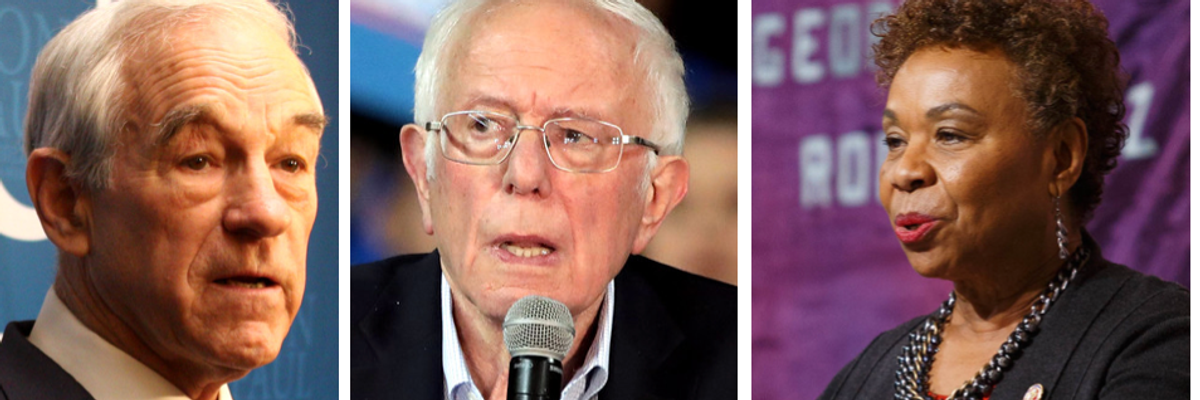This week “Ron Paul was right” trended on social media as video compilations of the former Republican congressman’s speeches were shared showing that he had been one of the few in Washington to predict how terribly U.S. intervention in Afghanistan would end.
Paul gained a sizable following during his two Republican presidential primary campaigns a decade ago, receiving one million votes in 2008 and doubling that number with two million in 2012. While the libertarian icon’s antiwar stance was always central to his messaging, that view marginalized him for most of his time in the GOP and particularly during the Bush-Cheney era when Republican identity was almost exclusively tied to war and unquestioning support of it.
Yet today, Paul looks prescient. So do a small handful of antiwar voices in both parties who were also generally kept at arm’s length by their parties for opposing the Washington foreign policy consensus.
Ron Paul’s son, Sen. Rand Paul, is arguably the most high profile and mainstream antiwar voice in American politics today on the Right (disclosure: I am currently employed by Sen. Paul’s campaign on a part time basis), but before he was elected the GOP establishment went out of its way to stop him. Paul’s Kentucky Republican primary opponent Trey Grayson received major endorsements from Senator Mitch McConnell, former New York City Mayor Rudy Giuliani and former Vice President Dick Cheney. When Paul beat the odds and won, neoconservative David Frum lamented, “How is it that the GOP has lost its antibodies against a candidate like Rand Paul?”
Frequent Ron Paul ally, the late former Republican Congressman Walter Jones became a fierce critic of the Iraq War and Bush administration, even saying in 2013 that Dick Cheney would “rot in hell” for his foreign policy. Neoconservative forces within the GOP would pour money into primary challengers to take out Jones every cycle and a few came close. A former Iraq War supporter, Jones saw the toll the war was taking on his North Carolina military community and told reporters that he sought forgiveness for sending sons and daughters into an unjust war. At one point he was in line to take a seat on the Armed Services Subcommittee on Readiness in 2007 and was denied that move. Roll Call reported that former Rep. Duncan L. Hunter told the North Carolina congressman “he couldn’t put him in that position because he knew Jones would vote with the Democrats to get out of Iraq.”
“I said, ‘Duncan, you’re exactly right; I will,” Jones recounted. “So that pretty much told me that by doing what you think is right, no matter what the issue might be, there’s a price to pay.”
There was a price to pay for antiwar Democrats as well.
Democratic Rep. Barbara Lee was the only member of Congress to vote against U.S. intervention in Afghanistan in 2001 and was called a “traitor” and worse by everyone, including members of her own party. She was physically threatened and harassed non-stop.
This week, Lee has been celebrated as the one congressperson who was right about how an American war in Afghanistan might turn out. Lee said on MSNBC Sunday that the Taliban immediately gaining power after U.S. withdrawal proves “that there is no military solution, unfortunately, in Afghanistan." She added, “We’ve been there 20 years; we’ve spent over a trillion dollars and we’ve trained over 300,000 of the Afghan forces.”
Similar to Ron Paul in the GOP, Sen. Bernie Sanders became a populist antiwar voice in the Democratic presidential primaries in 2016 and 2020, particularly in his sparring with fellow candidate and military hawk, Hillary Clinton, in 2016. As Sanders popularity continued to rise, Team Clinton helped tip the primary scales against the Vermont senator, as claimed by former Democratic National Committee head Donna Brazile in 2017. As his popularity grew, Ron Paul had a similar scam pulled on his campaign by the Republican establishment in 2012.
Antiwar political leaders across the ideological spectrum will likely always face daunting challenges no matter how many times the pro-war establishments in both parties are discredited.
The utter chaos and heartbreak that continues to unfold in Afghanistan could become the first test to see how much power and influence the forever war old guard has.
Or, as we have seen more often, it could not. Even America’s grand mistake in Afghanistan likely won’t convince those who knew they were right.
















